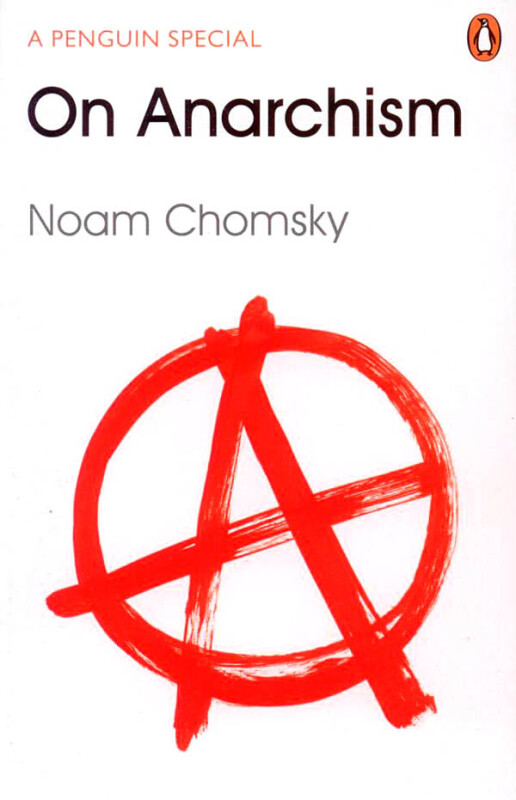neineon (e)k Noam Chomsky(r)en On Anarchism liburuaren kritika egin du
On anarchism gives me hope
4 izar
This book shows thru history of revolution and approachable messaging that a better is possible :)

192 orrialde
English hizkuntza
2014ko urr. 7a(e)an Penguin Books, Limited(e)n argitaratua.
With the specter of anarchy being invoked by the Right to sow fear, a cogent explanation of the political philosophy known as anarchism has never been more urgently needed. In On Anarchism, radical linguist, philosopher, and activist Noam Chomsky provides it. Known for his brilliant evisceration of American foreign policy, state capitalism, and the mainstream media, Chomsky remains a formidable and unapologetic critic of established authority and perhaps the world’s most famous anarchist.
On Anarchism sheds a much-needed light on the foundations of Chomsky’s thought, specifically his constant questioning of the legitimacy of entrenched power. The book gathers his essays and interviews to provide a short, accessible introduction to his distinctively optimistic brand of anarchism. Chomsky eloquently refutes the notion of anarchism as a fixed idea, suggesting that it is part of a living, evolving tradition, and he disputes the traditional fault lines between anarchism and socialism, emphasizing the power …
With the specter of anarchy being invoked by the Right to sow fear, a cogent explanation of the political philosophy known as anarchism has never been more urgently needed. In On Anarchism, radical linguist, philosopher, and activist Noam Chomsky provides it. Known for his brilliant evisceration of American foreign policy, state capitalism, and the mainstream media, Chomsky remains a formidable and unapologetic critic of established authority and perhaps the world’s most famous anarchist.
On Anarchism sheds a much-needed light on the foundations of Chomsky’s thought, specifically his constant questioning of the legitimacy of entrenched power. The book gathers his essays and interviews to provide a short, accessible introduction to his distinctively optimistic brand of anarchism. Chomsky eloquently refutes the notion of anarchism as a fixed idea, suggesting that it is part of a living, evolving tradition, and he disputes the traditional fault lines between anarchism and socialism, emphasizing the power of collective, rather than individualist, action.
Including a retrospective interview with Chomsky where the author assesses his writings on anarchism to date, this is a book that is sure to challenge, provoke, and inspire. Profoundly relevant to our times, On Anarchism is a touchstone for political activists and anyone interested in deepening their understanding of anarchism and the power of collective action.
This book shows thru history of revolution and approachable messaging that a better is possible :)
A big, red "A" dragged me to the book—Chomsky guided me to the counter.
His scientifical, social, linguistic approach led him to a profound analysis of the past and present society. His ideas are deeply true and sometimes hard to accept, because of how much we are accustomed to reality as it is...
The book is a collection of texts and interviews by Chomsky and gives a general idea of his thought: I found it hard to grasp the chapter on the Spanish revolution before the Franco regime, yet it was intriguing and I hope to reread it in the future. The last chapter was instead marvelous in my opinion, as I truly believe in studying language and its science as a manner of understanding human behaviour.
"It seems to me fair to regard the contemporary study of language as in some ways a return to the Humboldtian concept of …
A big, red "A" dragged me to the book—Chomsky guided me to the counter.
His scientifical, social, linguistic approach led him to a profound analysis of the past and present society. His ideas are deeply true and sometimes hard to accept, because of how much we are accustomed to reality as it is...
The book is a collection of texts and interviews by Chomsky and gives a general idea of his thought: I found it hard to grasp the chapter on the Spanish revolution before the Franco regime, yet it was intriguing and I hope to reread it in the future. The last chapter was instead marvelous in my opinion, as I truly believe in studying language and its science as a manner of understanding human behaviour.
"It seems to me fair to regard the contemporary study of language as in some ways a return to the Humboldtian concept of the form of language: a system of generative processes rooted in innate properties of mind but permitting, in Humboldt's phrase, an infinite use of finite means. Language cannot be described as a system of organization of behavior. Rather, to understand how language is used, we must discover the abstract Humboldtian form of language—its generative grammar, in modern terms."
The emphasis is of course on anarchism and its political and capitalistic enemies, and really shakes the foundation of the society as we know it. A not-so-easy but inspiring book.